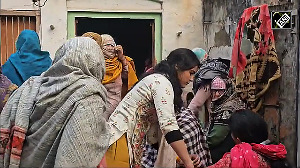Operation Romeo is disappointing not because it is a bad or boring film, but because it did have something significant to say and chickened out, observes Deepa Gahlot.

The title of this film, directed by Shashant Shah, comes from the actual name of an operation launched by the police in Delhi and parts of north India.
Operation Romeo was meant to curb 'eve teasing', but was used to harass and intimidate young couples, in a misguided attempt to protect the female.
The cops, while extorting money from the couples, took advantage of the fact that they were, in all likelihood, dating in secret. Handing over control of private matters to the State can have unsavoury side effects.
Operation Romeo, co-produced by Neeraj Pandey, an official remake of the Malayalam film Ishq Not A Love Story (2019, Anuraj Manohar), conveys the contradictions of contemporary urban Indian society (written by Rateesh Ravi and Arshad Syed) in which young people aspire to a liberal 'westernised' lifestyle, but give families control over their personal lives.
It is worse when it comes to girls from conservative families, where an attempt to break away can lead to punishment that media has labelled with easy terms like 'honour killings' and 'love jihad'.
Whatever may be said in debates about toxic masculinity, for years popular cinema has endorsed vigilante justice; the heroism of the leading man hinges on his ability to protect 'his' women, or, if he fails, then take revenge against the man who 'defiled' them.
All this, plus the issues of caste and class, hover over the ordeal Aditya (Sidhant Gupta) and Neha (Vedika Pinto) are put through when they go out on a date to celebrate her birthday. Both have lied to their families about where they are, as they take off in his car, from the suburbs to south Mumbai.
He parks on a deserted street, and harangues Neha for a kiss -- this is always perceived as cute in films, but is actually odious behavior.
The girl is expected to act coy and demur, which seems to be a part of the Indian dating ritual.
Suddenly bright light from a phone camera shines on them and a man (Sharad Kelkar) claiming to be a cop, start terroriSing them, and soon calls another cohort (Kishor Kadam).
Aditya is reduced to a trembling wreck, while Neha weeps in the car.
In their fear -- of what might happen to her, of their families finding out -- it doesn't occur to them to ask the men for id or try to call for help.
The men barge into the car to force him to drive to an ATM to get money to bribe them; their banter borrows a lot from popular films and ad jingles, that shows how teasing, stalking and sexual harassment has been normaliSed on screen, especially through songs.
Neha is left alone in the car for a short while, and once the men have been paid off, Aditya wants to know what he did to her.
'I need to know, as a man,' he says.
Over the next few days, he is obsessed by the incident, and whether Neha was touched by another man. (In a throwaway scene, a bunch of boys in Aditya]s building, armed with hockey sticks, plan to beat up a man who molested the sister of one of their friends because that is what boys are supposed to do!)
Up to this point, the film is scarily effective in a 'but for the grace of God's way', and then unravels, because machismo has to be saved.
The ordinary IT professional grows a beard, starts smoking and drinking, and acquires a faux-manly look.
Then he finds out that the men are not cops at all -- one is an ambulance driver, and the other a tailor.
They have obviously done this before because dark, empty streets are paved with extortion gold.
Aditya then goes to the home of the driver, and bullies his wife (Bhumika Chawla) and daughter. He later beats up the man, makes him admit that 'nothing' happened in the car, and swaggers out; his manhood revived.
Now he can reconnect with Neha because she is 'pure'.
In spite of its anti moral-policing stance, the film does not have the courage to contemplate what might have happened if Neha was raped.
What if the two really were policemen (the case of a cop raping a girl in a police chowky had hogged headlines a few years ago)?
What if the truth was revealed to the families?
It lets Aditya off the hook, allows family ties to remain untested. It builds up outrage and lets it dissipate to nothing.
The young actors are likeable, the two goons scary.
Hari Nair's camera captures the horror-movie ambience of south Mumbai by night.
Operation Romeo is disappointing not because it is a bad or boring film, but because it did have something significant to say and it chickened out.












 © 2025
© 2025